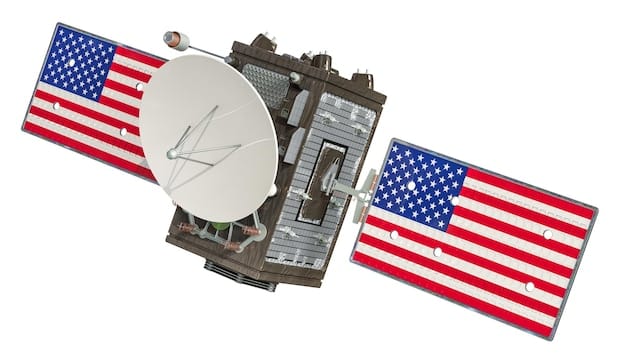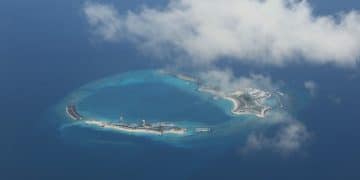US Space Force: Impacts on Global Relations & Security

The U.S. Space Force (USSF) has potential impacts on international relations by altering power dynamics, increasing the risk of weaponization of space, and creating new challenges for international cooperation and security agreements.
The establishment of the U.S. Space Force (USSF) has sparked intense debate worldwide. This move signifies a pivotal shift in how nations perceive and engage with space, extending beyond scientific exploration into the realms of military strategy and international relations. But what are the potential ramifications of this new military branch on the global stage?
Understanding the Genesis of the US Space Force
The U.S. Space Force was officially established on December 20, 2019, marking a monumental shift in the U.S. approach to space security. It was formed under the Trump administration as a separate branch of the military, aiming to consolidate and enhance U.S. space operations.
Motivations Behind the USSF
The creation of the USSF was driven by several key factors. Firstly, there was a growing recognition of space as a critical domain for national security. Secondly, the United States wanted to maintain its competitive edge against other nations investing heavily in space capabilities. Finally, the USSF was intended to streamline and improve the efficiency of U.S. space operations by centralizing command and control.
Initial Reactions from Around the World
The establishment of the USSF elicited varied reactions across the globe. While some nations saw it as a legitimate effort to protect U.S. assets in space, others viewed it with suspicion, fearing it could lead to the weaponization of space and a new arms race. Understanding these initial reactions is crucial to assessing the long-term implications for international relations.
- Allies: Many U.S. allies, particularly those within NATO, expressed cautious support, recognizing the need for enhanced space security but emphasizing the importance of maintaining space as a peaceful domain.
- Rivals: Countries like Russia and China voiced concerns, interpreting the USSF as a move towards the militarization of space, potentially destabilizing international security.
- Neutral Nations: Several nations adopted a wait-and-see approach, emphasizing the need for international cooperation to prevent an arms race in space.
In summary, the creation of the USSF was motivated by the need to protect U.S. assets in space, maintain a competitive edge, and streamline operations. However, it also sparked varied reactions globally, ranging from cautious support to outright concern, setting the stage for complex shifts in international relations.

Potential Impacts on International Security
The U.S. Space Force has several potential impacts on international security. Its actions and capabilities directly influence the strategic balance among nations. Understanding these implications is crucial for maintaining global stability.
Risk of Space Weaponization
One of the most significant concerns is the potential for the USSF to accelerate the weaponization of space. As nations enhance their space capabilities, the risk of deploying offensive weapons in space increases, leading to a dangerous arms race. This could destabilize international relations and make conflicts more likely.
Alterations to the Strategic Balance
The USSF could alter the strategic balance by providing the United States with a significant military advantage in space. This advantage could extend to other domains, such as cyber and terrestrial warfare, potentially shifting global power dynamics. Nations may feel compelled to develop their own space forces to counter this advantage, further escalating tensions.
- Increased Surveillance: Enhanced surveillance capabilities could lead to increased espionage and mistrust among nations.
- Counterspace Capabilities: The development of counterspace capabilities could threaten the satellites of other nations, disrupting communication, navigation, and intelligence gathering.
- Strategic Deterrence: The USSF could serve as a deterrent, discouraging other nations from aggressive actions in space.
In conclusion, the USSF could accelerate the weaponization of space and alter the strategic balance, posing significant risks to international security. While it may act as a deterrent, the potential for increased tensions and a space arms race cannot be ignored.
Economic Ramifications of Space Militarization
Space militarization, driven in part by the establishment of the US Space Force, has profound economic ramifications. These include shifts in investment, the development of new industries, and potential economic vulnerabilities.
Investment Shifts
Increased military spending on space will likely divert resources from other sectors. Governments may allocate more funds to defense and aerospace industries, potentially at the expense of social programs, education, and infrastructure. The economic impact depends on how efficiently these resources are managed and whether they stimulate innovation.
New Industry Development
The focus on space militarization can drive the development of new industries related to space defense technologies. These industries could create jobs and economic opportunities, boosting innovation in areas such as satellite technology, cybersecurity, and advanced materials. However, the economic benefits may be concentrated in specific regions and sectors.
Investing in space militarization can lead to both opportunities and challenges. New industries may emerge, benefiting from technological advancements. Conversely, dependence on space assets could create vulnerabilities that adversaries might exploit, leading to significant economic disruptions.

- Cybersecurity Reliance: More cybersecurity jobs.
- Space Industries Growth: Development of space technologies.
- Regional Benefits: Creation of regional jobs.
To sum up, the economic ramifications of space militarization involve investment shifts, the development of new industries, and potential economic vulnerabilities. Balancing the benefits of technological innovation with the risks of economic disruption is crucial for navigating this new landscape.
Diplomatic Challenges and Opportunities
The US Space Force presents both diplomatic challenges and opportunities on the international stage. Its existence impacts international cooperation, treaty negotiations, and the overall state of diplomatic relations.
Impact on International Cooperation
The establishment of the USSF has complicated international cooperation in space. Some nations are wary of collaborating with the United States on space projects, fearing that it could benefit U.S. military objectives.
Challenges in Treaty Negotiations
Negotiating new treaties on space activities has become more challenging due to the USSF. Other nations may be reluctant to agree to restrictions on space activities. This reluctance can hinder efforts to create norms of responsible behavior in space and prevent an arms race.
Space activities are closely linked to national security objectives. The US military interests in space assets for surveillance, communication, and navigation are vital for defense. However, these activities can be misinterpreted by other nations as aggression, leading to heightened tensions and mistrust. Diplomatic efforts must manage these perceptions to build a common ground.
- Promote Transparency: Increase communication about space activities.
- Foster Dialogue: Engage in bilateral discussions.
- Build Trust: Create joint projects to strengthen relationships.
In conclusion, the US Space Force presents both diplomatic challenges and opportunities. While it has complicated international cooperation and treaty negotiations, it also underscores the need for enhanced dialogue and trust-building measures to ensure a peaceful and secure space environment.
Legal and Ethical Considerations
The emergence of the US Space Force raises crucial legal and ethical considerations regarding space activities. These concerns revolve around the interpretation of existing treaties, the weaponization of space, and the ethical responsibilities of nations operating in space.
Interpretation of the Outer Space Treaty
The Outer Space Treaty of 1967 is the cornerstone of international space law. It prohibits the placement of weapons of mass destruction in space and limits the use of the Moon and other celestial bodies to peaceful purposes. However, the treaty is vague on the issue of conventional weapons in space. This ambiguity has led to debates over whether the USSF’s activities comply with international law.
Weaponization of Space
A central ethical concern is the potential for the USSF to contribute to the weaponization of space. While the United States maintains that it does not seek to weaponize space, others fear that the USSF could lead to the development and deployment of offensive space weapons. This could undermine global stability and trigger an arms race.
Ethical responsibilities for nations operating in space are vital. It is important to promote peaceful uses of space through the cooperation with scientists and the promotion of new technologies. However, it is important to ensure access to satellite services for navigation and comimunication for all parties involved.
Future Scenarios and Predictions
Looking ahead, the US Space Force is likely to play an increasingly significant role in international relations. Several future scenarios can be envisioned, each with its own implications for global security and cooperation.
Increased International Competition
One likely scenario is increased international competition in space. As more nations develop their space capabilities, the risk of conflict in space will grow. This competition could extend to areas such as satellite technology, counterspace capabilities, and resource exploitation. The USSF will need to navigate this landscape carefully to protect U.S. interests while avoiding escalation.
Potential for International Cooperation
Despite the challenges, there is also potential for increased international cooperation in space. Nations could work together to address common challenges such as space debris, climate change, and asteroid defense. The USSF could play a role in fostering this cooperation by promoting transparency, sharing data, and engaging in joint projects.
- Conflict Mitigation: Space agreements will be needed.
- Technology Development: More innovative progress.
- Global Collaboration: Shared effort to address common interest.
In summary, the future scenarios for the US Space Force include increased international competition and the potential for international cooperation. Balancing these competing trends will be critical for ensuring a peaceful and prosperous future in space.
| Key Aspect | Brief Description |
|---|---|
| 🚀 Space Weaponization | Potential arms race in space due to offensive capabilities. |
| 🛰 Strategic Balance | The USSF alters strategic balance giving advantage to cyberwarfare and terrestrial warfare. |
| 🤝 International Cooperation | Suspicions hinder collaboration in space projects and treaty negotiations. |
| ⚖️ Legal Discussions | Space laws and discussions affect weaponization concerns given vague international regulation. |
Frequently Asked Questions
▼
The primary mission is to protect U.S. and allied interests in space by deterring aggression, defending space capabilities, and providing space forces to support joint military operations.
▼
The USSF complicates treaty negotiations by raising concerns among other nations about the militarization of space. It effects overall effort towards ensuring no one weaponizes space.
▼
Economic effects include shifts in investment, the rise of new industries, and potential vulnerabilities due to reliance on space assets. Investment shifts are caused by allocation of defense funds.
▼
Challenges include mistrust, hinderance in cooperation, and the perception of US dominance in space. These issues can strain diplomatic relations and slow down cooperative programs.
▼
By promoting transparency, engaging in open dialogue, and fostering trust-building measures through joint projects, global collaboration on the project can be greatly improved for the USSF project.
Conclusion
In conclusion, the U.S. Space Force presents both opportunities and challenges for international relations. While it enhances U.S. capabilities in space, the potential implications for security, diplomacy, and economic stability must be carefully managed through international cooperation.





